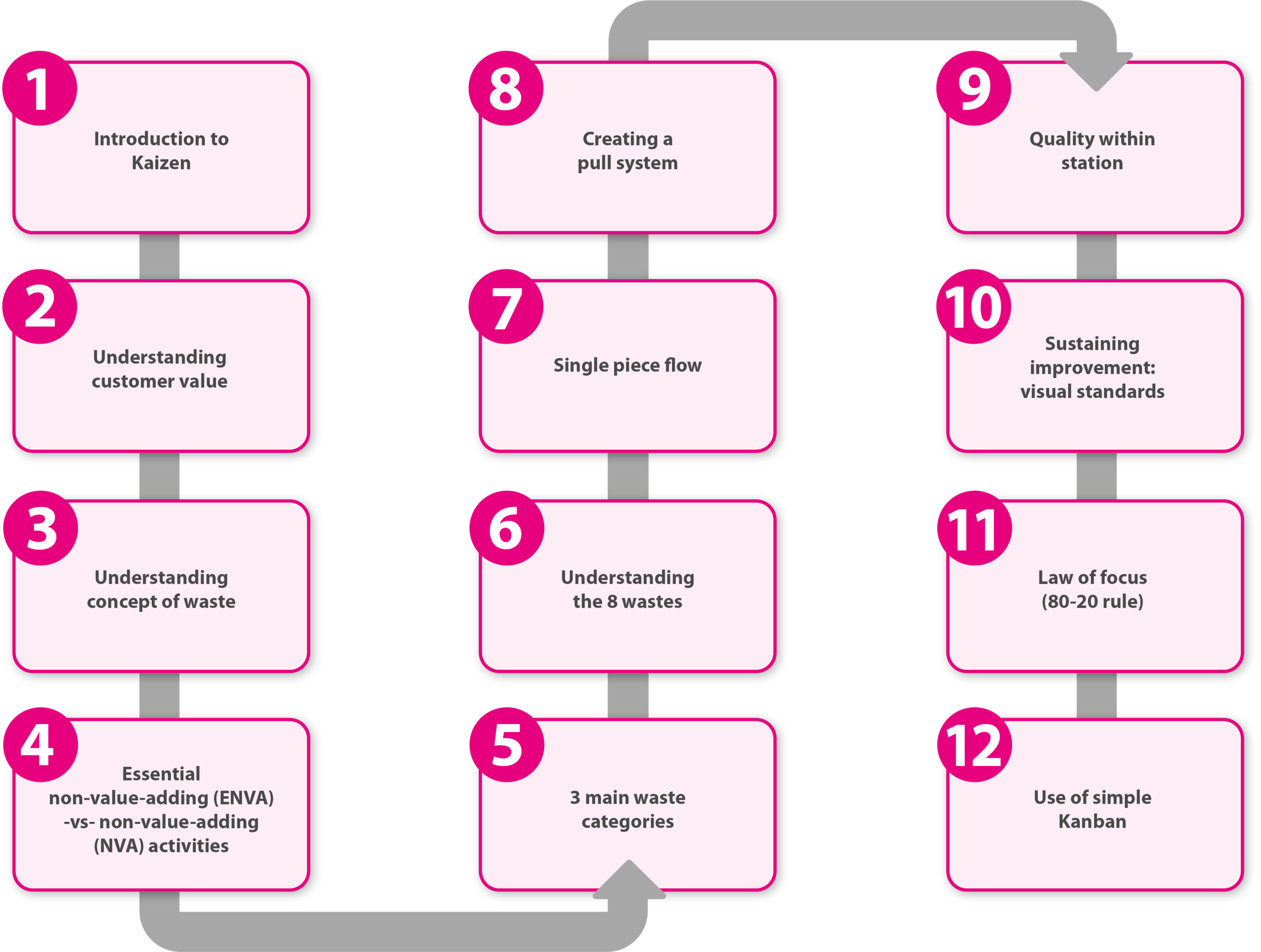
The Lean Competency System curriculum: 4 Levels
The LCS qualifications framework has seven competency levels, ranging from Level 1a to Level 3b.
They are grouped into three categories: 1) Fundamental, 2) Technical and 3) Strategic. The levels cover a broad range of competency, from awareness of core principles of lean, right up to strategic lean leadership.
The sQuid LearnHub will be offering level 1a to 1c through the digital platform. All other levels will be offered through classroom learning.
Accredited courses are aligned to a particular level, which allows certificates to be issued to those who successfully complete the course assessment.
Each Level has a Descriptor, which states what knowledge and practical capability an individual should possess. The key focus of each descriptor is shown below and also provided in the descriptor PDF document.
Module 1 Lesson Plan
-
Provides core elements and concepts around waste and value. This 12-week module involves looking through the lean lens to view the business as a series of value adding activities and non-value adding activities.
This module will also touch on a few tools that the user can already start to implement on the shop floor. This module will touch on several topics as listed below:
Core elements: Value, waste, flow, pull; value adding/non-value adding muri (overburden) and mura (unevenness)
Introduction to Lean tools: Single piece flow, quality in station, 80-20 rule and Kanban
-
Awareness and a basic understanding of lean thinking principles and underlying continuous improvement concepts and an ability to understand and articulate fundamental lean ideas.
A course aligned to Level 1a will typically include several of the topics listed under each subject area below:
Origins & evolution, key contributors: Ford, Taylor, Deming, Training Within Industry (TWI), Toyota-TPS (Ohno), Shingo, Womack & Jones
Underpinning and related concepts and approaches: Scientific thinking and the ‘scientific method’; systems thinking, process thinking, continuous improvement, Kata, Six Sigma, Theory of Constraints, Agile
Key principles & frameworks: W&J’s Five Lean Principles; Seddon’s CHECK methodology; PDCA; DMAIC (& variants); ToC
Core elements: the value stream map
Human and strategic dimensions: human dimensions and the enabling factors for sustainability and culture change; engagement, leadership, policy deployment.here
-
Knowledge of lean diagnostic, analytical and planning techniques and the ability to use them in the workplace to understand customer/stakeholder value, the current state, solve problems and propose future states.
A training programme that aims to cover the knowledge requirements for LCS Level 1b is likely to reference several of the following topics:
Purpose, customer/stakeholder value: QFD; Kano; VoC; cycle of service; service encounter; idea management; public value (Moore)
Mapping: current state and future state; value stream mapping, Learning to See, brown paper mapping; SIPOC; process mapping, spaghetti diagrams; quality filter; customer journey; swim lane; four fields; flow charts
Quality: Kano model; seven quality tools (cause-and-effect diagram/Fishbone, check sheet, control chart, histogram, Pareto chart, scatter diagram, flow chart/run chart); mistake proofing, Gaps model of service quality; poka yoke; checklists; variation reduction & six sigma, SPC
Problem-solving, FMEA; means-ends analysis; soft systems methodology; 8D problem solving; DMAIC; PDCA; A3; Five Whys; CATWOE; Four Frame approach; Drill Down; Cause & Effect (Fishbone)
Data and analysis: seven quality tools; Design of Experiments; Measurement Systems Analysis /Gage R&R; surveys; Kingman’s equation
Demand and capacity: demand analysis and understanding; value/failure demand identification; ToC five steps
Planning & communicating: QCD measures; A3; visual management; communication boards; project management and organisation; team roles and function; Agile approach - scrum
-
This level focuses on knowledge, understanding and application of lean improvement and implementation techniques. Those at LCS 1c should be able to actively participate in improvement activities in the workplace.
A training programme that aims to cover the knowledge requirements for LCS Level 1c is likely to reference the topics listed below. The list is indicative; some topics may not be relevant, some will require passing reference only and there may be other relevant topics that are not included in the list.
Workplace organisation: 5S; cell design; layout; 3P – production, preparation, process; ergonomics
Standard operations: SOPs; standards; leader-standard-work; TWI (job instruction, job methods)
Visual management and performance measures: A3; display boards; Andon; team communications
Scheduling and capacity planning: Theory of Constraints; pull systems; Kanban; Heijunka; drum buffer rope; CONWIP; runners-repeaters-strangers
Enablers for flow: Takt time; TPM; SMED; OEE; demand management; mistake proofing/poke yoke; activity timing
Management and planning: Policy deployment/Hoshin Kanri; project management; performance management; Scrum
People, teams and sustainability: leadership; coaching; change management
-
Develop fundamental critical-thinking skills and enhanced problem-solving competencies and earn an official certificate of competence from LCS, a Cardiff University service. Completion of each level and successful assessment will build your knowledge as you embark on this lean journey.
Assessment is continuous and based on a series of exams completed online. To be issued with a certificate, you’ll need to meet the passing mark requirements outlined in the course handbook.
Your certificate will be issued in your legal name and sent to you upon successful completion of the course, as per the stipulated requirements. The LCS certificate issued will also contain the logo of the issuing organisation, in addition to the LCS and Cardiff University logos.
* Certificates will be issued by Delta Blade Consultants
** Certification will be issued by LCS , a Cardiff University service through Delta Blade Consultants. Additional GBP 75 fee will be charged to undertake any examination.
